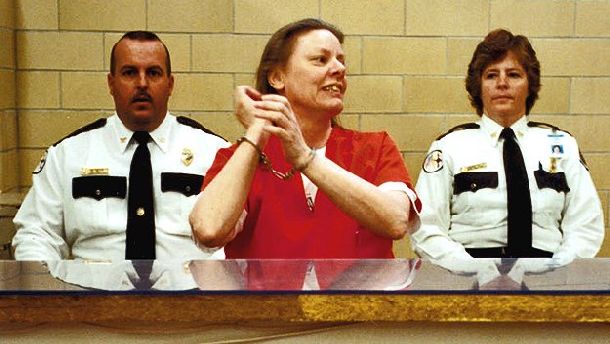Aileen: Life and Death of a Serial Killer (2003) 

Director: Nick Broomfield
Cast: Aileen Wuornos, Nick Broomfield, Terry Humphreys-Slay
Synopsis: Nick Broomfield’s second documentary on Aileen Carol Wuornos, a highway prostitute who was executed in 2002 for killing seven men in the state of Florida. This second installment includes the filmmaker’s testimony at Wournous’s trial.
Aileen Wuornos was one of those people who seem destined for a life of misery from the outset. She came from what would commonly be termed trailer-trash stock. Her father, whom she never met, was imprisoned for the rape and attempted murder of a seven-year-old girl; her mother abandoned her and her brother to the care of their grandparents when Aileen was just a toddler. According to Wuornos, her alcoholic grandfather frequently sexually assaulted and raped her. By the time she was eleven, she was already engaging in sexual acts in return for cigarettes and drugs. One witness at her trial recalls how although he regularly saw Wuornos for sex, if she tried to approach him in public he would ‘throw rocks’ at her. It was perhaps inevitable that she would eventually fall pregnant — and, so twisted was her life, it was almost equally inevitable that the pregnancy would not occur as a result of these consensual sexual encounters, but after she was raped by a friend of her grandfather’s. The baby was immediately handed over for adoption, and a few months later Aileen dropped out of school. Following the death of her grandmother, Aileen’s grandfather threw her out of the family home. She lived rough in nearby woods and supported herself by prostitution.
Of course, as wretched and tragic all this troubled history is, it fails to excuse Wuornos for the murder of seven men for which she was sentenced to death, but it does at least provide an insight into the influences that shaped America’s first female serial killer, and a scathing condemnation of a society that allows such abuse to go unpunished and set in motion a vicious and deadly cycle. Nick Broomfield’s film, the second he has made on the subject of Wuornos, takes a lot of care in explaining Aileen’s history. Whether Broomfield does this to offer some kind of mitigation for what she did, or to perhaps explain how he was convinced by Wuornos that she was innocent of the crimes, is debatable, but whatever the reason Aileen: Life and Death of a Serial Killer paints a unique picture of a severely damaged woman and the quite frankly grotesque world in which she lived. Everything about Aileen Wuornos’s life was mean and dirty and worthless, and just a glimpse of it is enough to fill the viewer with despair.
After more than thirty years of being abused — and abusing: she once beat her seventy-six-year-old husband with his own cane — Wuornos gave up on men and embarked on a relationship with Tyra Moore, a hotel maid. The couple survived — barely — on Wuornos’s earnings from prostitution. Moore too would betray Wuornos when the police finally apprehended them for the murders by coaxing her into confessing in return for immunity from prosecution. Broomfield’s earlier movie focused on the media circus that surrounded Wuornos’s trial and its exploitation by various parties — including police officers and lawyers — to negotiate lucrative movie deals, while Aileen: Life and Death of a Serial Killer concentrates more on her deteriorating mental state as the date for her execution draws near. Tired of living on Death Row, Wuornos wanted to die — but whether she was psychologically capable to face execution was debatable. Broomfield’s movie suggests that the authorities were as keen to get her off their hands as she was to be off of Death Row.
It’s fairly obvious that Wuornos was unstable. The open, friendly image she sometimes projects turns into wild-eyed rage in an instant, and her paranoia worsens considerably as the date for her execution draws near. In Broomfield’s final interview with her, she claims that the authorities are bombarding her head with sonic pressure, possibly through the TV or mirror in her cell, and that when she dies she will be beamed up to a spacecraft, Star Trek-style. These comments come just one day after she has been found sane enough to be executed.
Ironically, the cast of characters in this movie would probably be considered too far-fetched for a fiction movie. There’s Steve Glazer, Wuornos’s inept pot-smoking defence counsel during the trial. Heavily-bearded, overweight and sporting a natural Afro, he operated under the name of Dr. Legal, and was so far out of his depth it’s a wonder that he ever managed to resurface; there’s the neighbourhood paedophile from Wuornos’s childhood who liked to pick at the shells of freshly-laid eggs before the chicks inside were ready to hatch (a hideously suitable metaphor for his depraved sexual proclivities), there’s the cadaverous cross-dresser with whom Wuornos briefly shared a hideout in the woods as a teenager; there’s the former girlfriend who believes lesbians and homosexuals didn’t even exist before Aileen Wuornos came along; there’s even a guy called The Human Bomb.
And then there’s Aileen herself, a weathered, haggard shell of a woman upon whose face every harsh and bruising day had left its mark. There’s little doubt that she was close to insane by the time of Broomfield’s final interview, clinging onto whatever remained of her sanity in order to ensure nothing delayed her execution. The way in which she switches seamlessly from an apparently lucid and reasonable woman into a shrieking, bulging-eyed harridan is something to see. It’s a truly frightening transformation, and it’s not difficult to put oneself in the position of those men who were her victims, and imagine how they too must have seen that same rage on her face in the fading seconds of their lives…
httpv://www.youtube.com/watch?v=rExhihAZGxg
